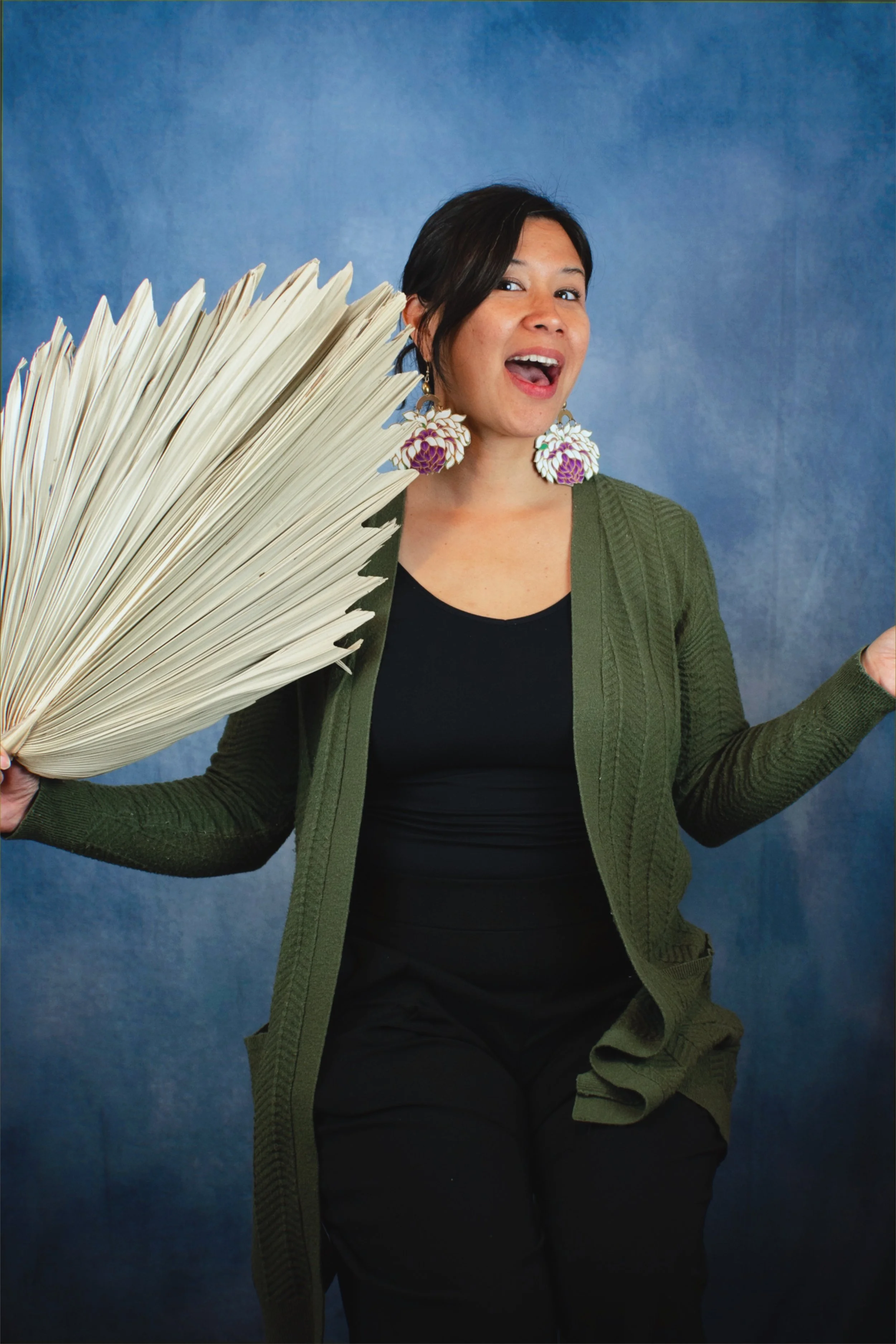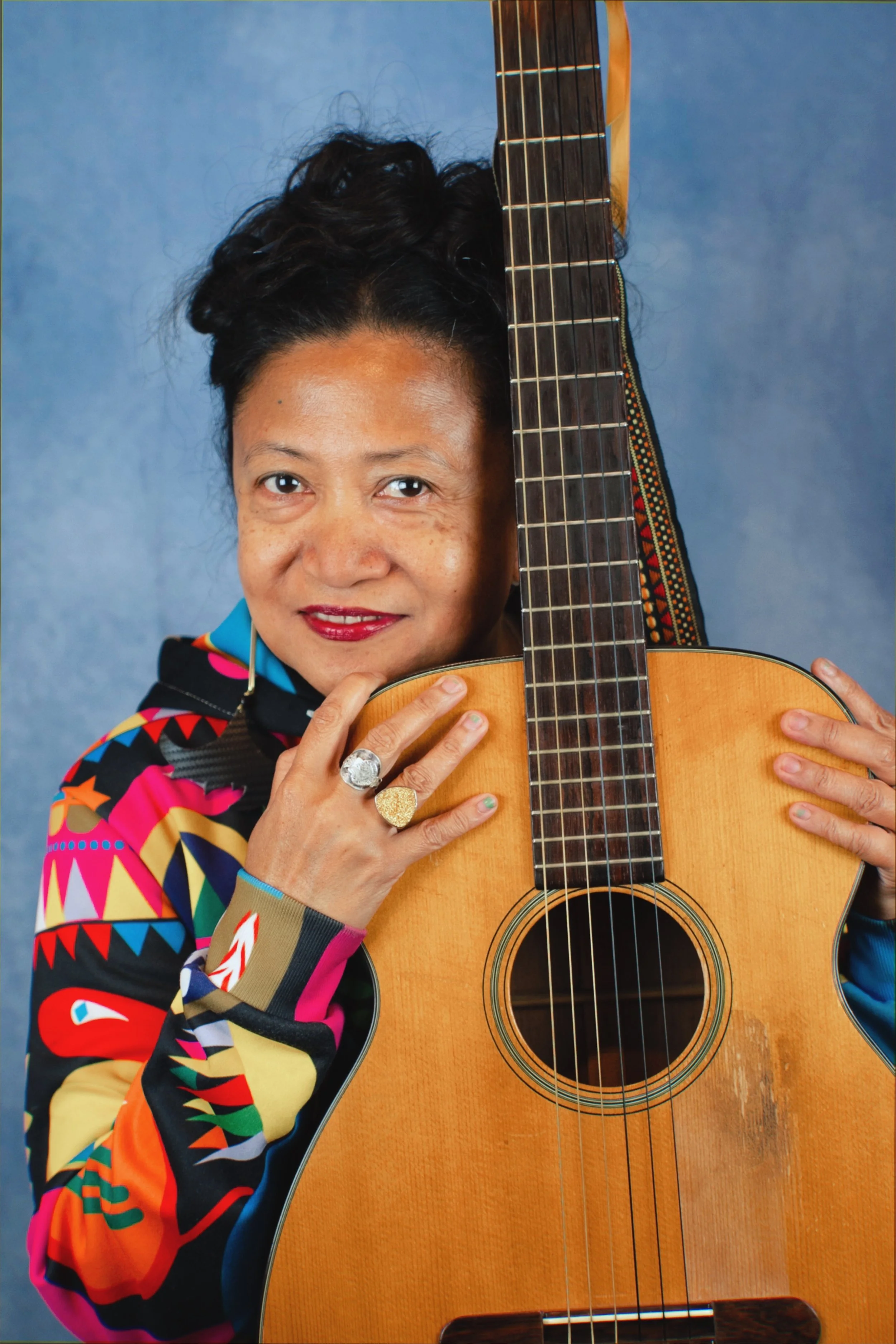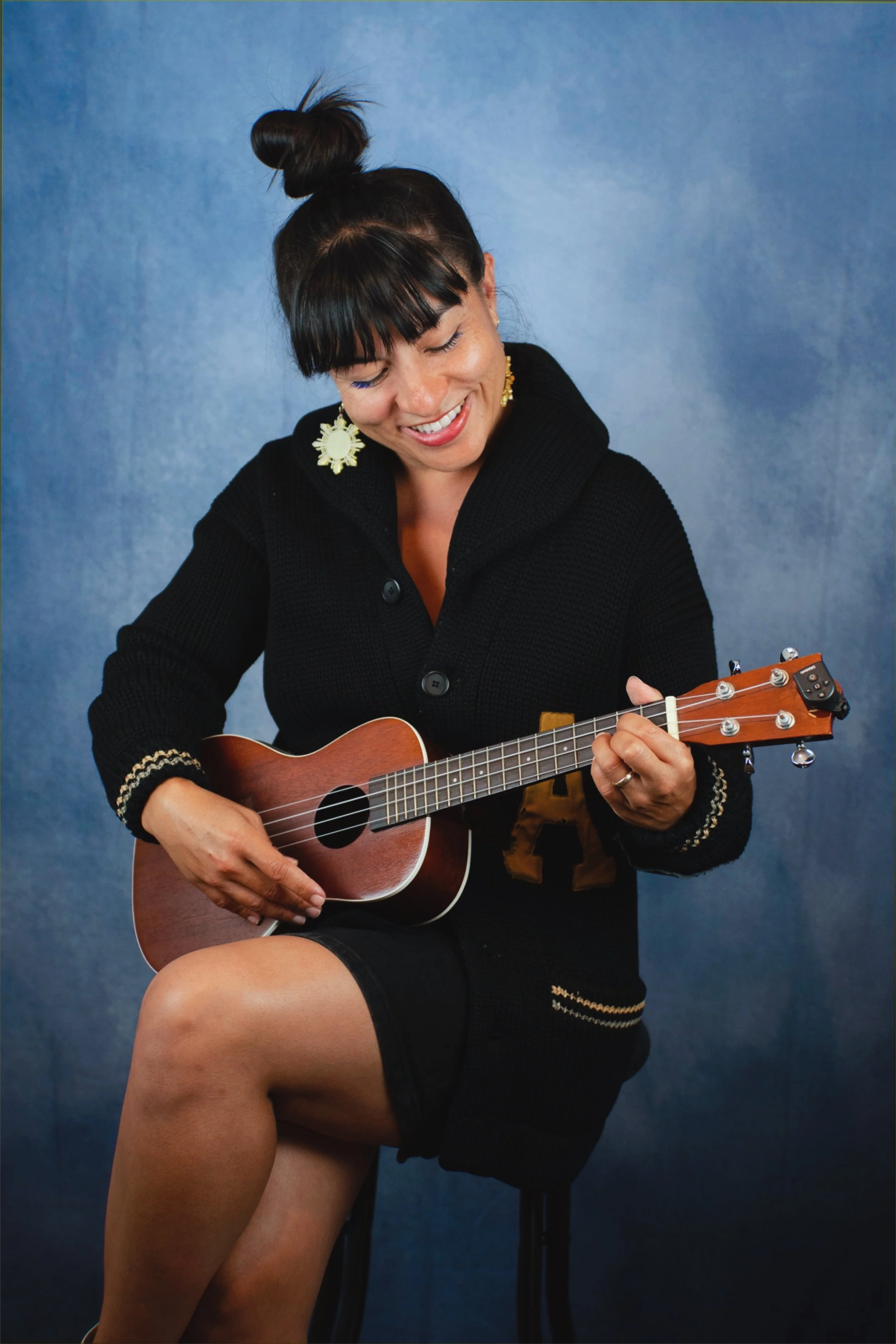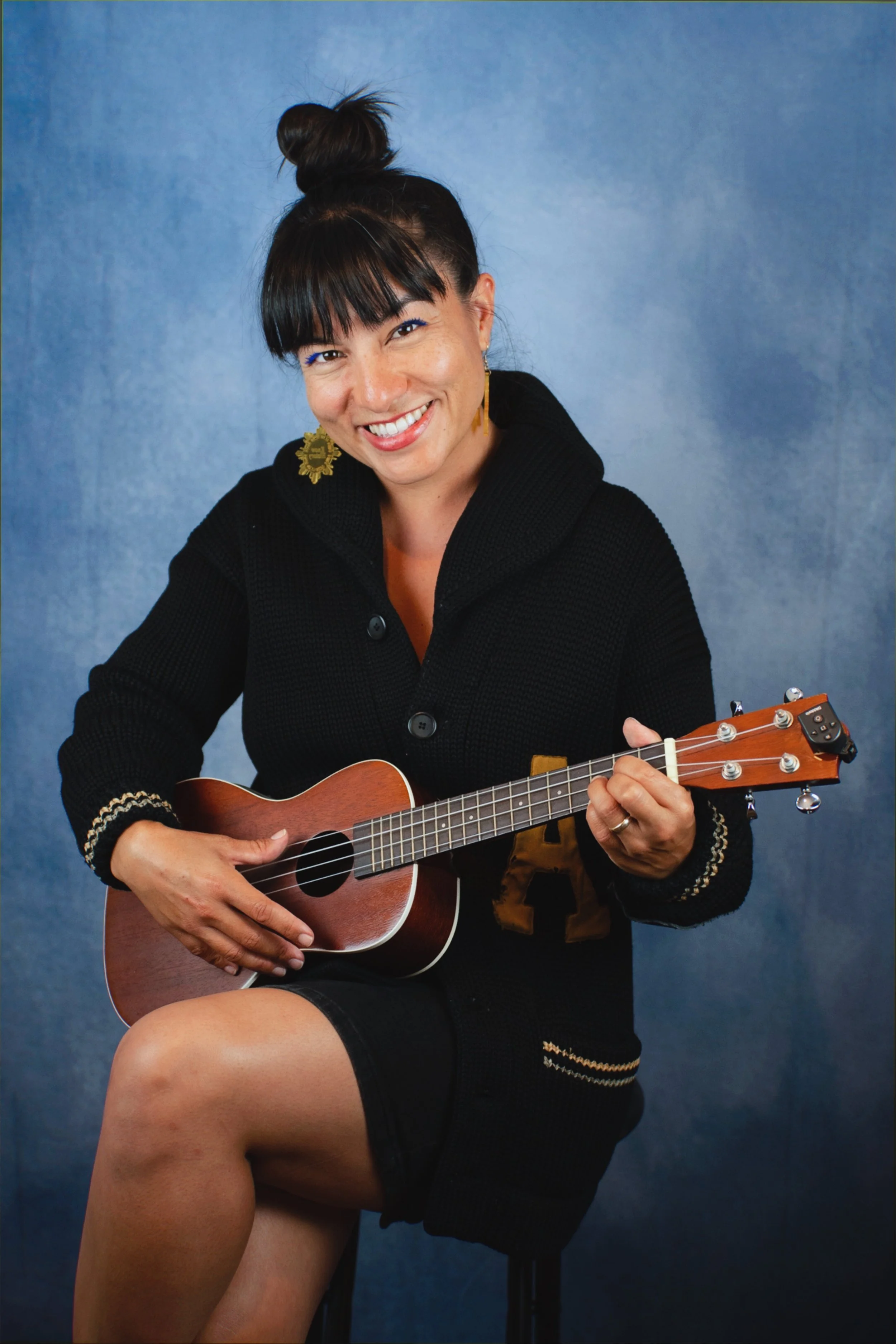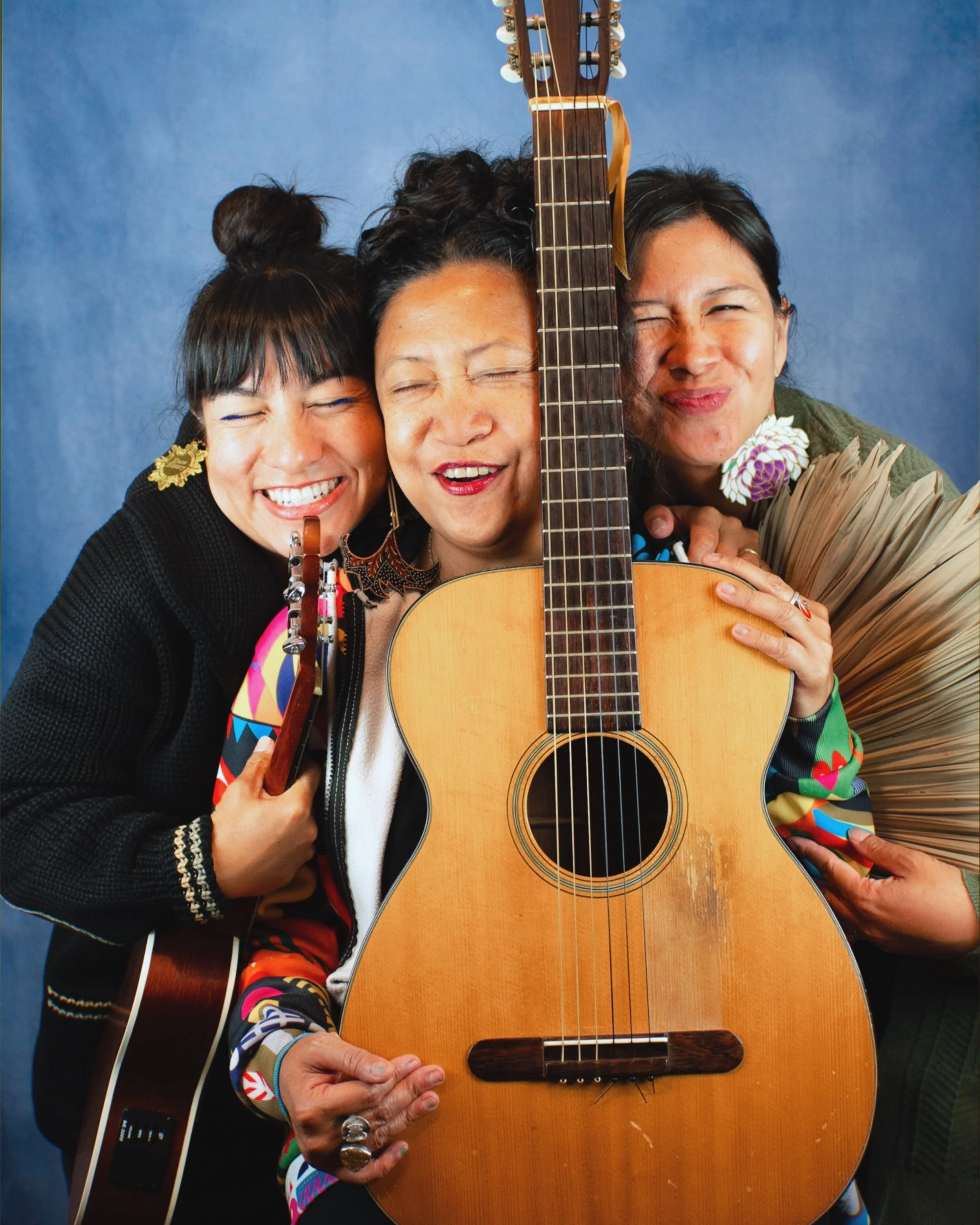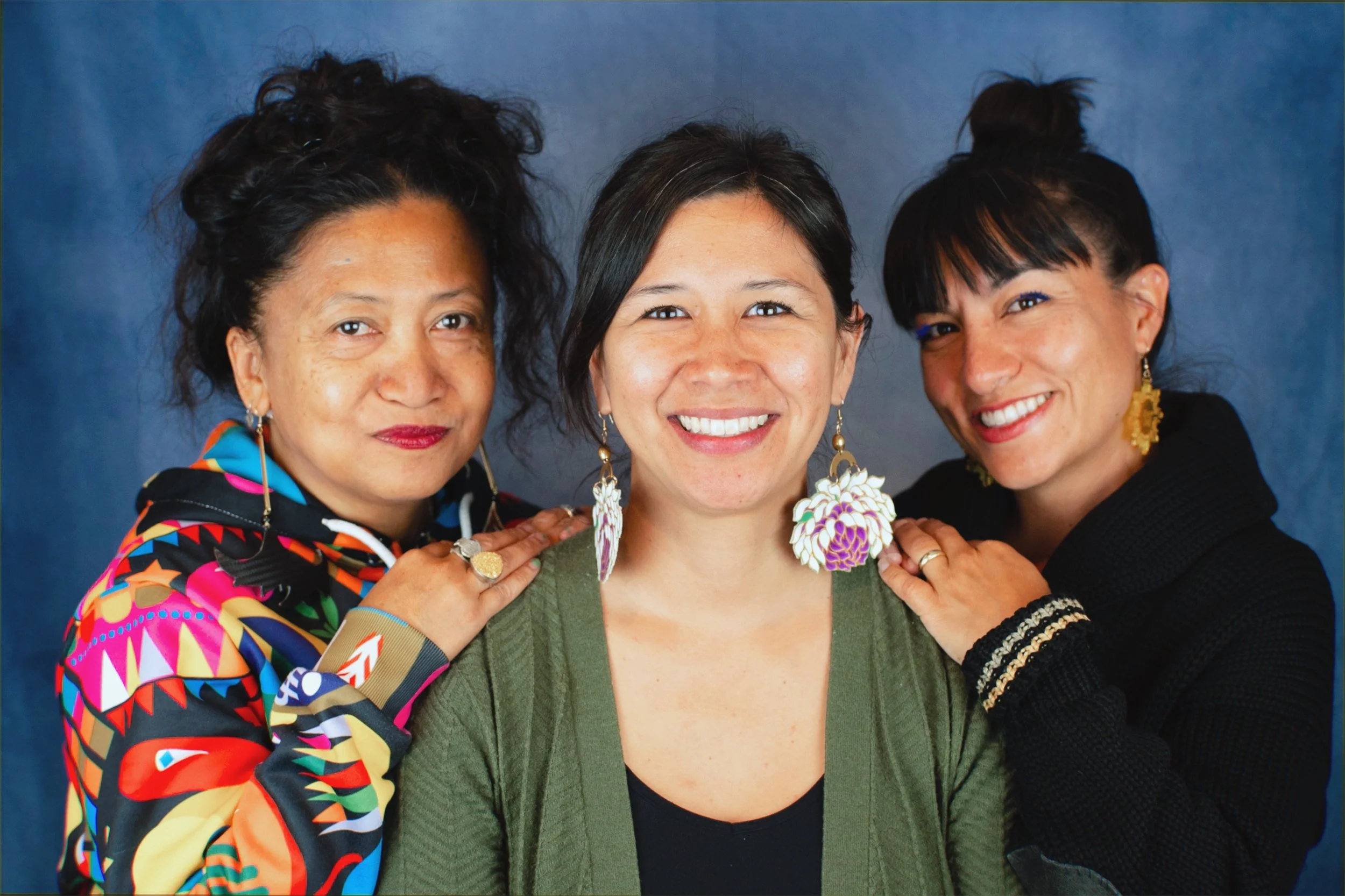The Sampaguitas: Reviving Legacy + Memory Through Harmony
by Jaeya Bayani
Based in the San Francisco Bay Area, The Sampaguitas sing Filipino folk songs and originals in three-part harmony. Drawing influences from folk, blues, doo-wop girl groups, and the Filipinx-American diaspora, Jenevieve Francisco, Cristina Ibarra, and Aireene Espiritu share music from their roots and explore what it means to be in a “third culture” between worlds. The Sampaguita is the national flower of the Philippines; it’s only fitting to describe the sweet sounds from their melded vocal textures, tones, and tight harmonies.
Aireene, Jenevieve, and Cristina, Photo courtesy of @alyssamcorpuz.
Espiritu, Francisco, and Ibarra met in San Francisco and immediately connected over their shared ancestry and love of music. Their collaboration evolved organically, each bringing musical strengths into the fold. Using Filipino folk songs as a way for them to explore their cultural roots, they soon found that singing together unlocked a deep connection, not only to each other, but to audiences as well.
“We each come from different experiences and familiarity with the language. But getting to sing and learn Tagalog, it feels like stepping into a river that flows back to our ancestors. Singing these songs together is like creating our own connection to the country of our roots, and standing proudly in our Pinay heritage.”
Photo courtesy of @alyssamcorpuz.
Please introduce yourself, your craft, and the project you are working on.
All: We are the Sampaguitas.
Aireene: I’m Aireene Espiritu.
Jenevieve: I'm Jenevieve Francisco.
Cristina: I'm Cristina Ibarra.
Aireene: We sing Filipino folk songs in Tagalog and originals inspired by working together and delving into our the third culture of being Fil-Am culture — which our project is about — as well as our experiences of being born in the Philippines, coming here, and being of mixed Fil-Am [heritage]. We want to explore what that's like, and we're going to work on writing original stories, original songs.
“We all have a different journey, but also have a shared story, culture, and experience. This project is an opportunity for us three to bring that together, as well as share, bond, and connect over that experience.”
Jenevieve: There's something to be said about navigating what your identity and culture is. We're coming to our identities from different but shared places. I'm of Mexican and Filipino ancestry, but [I was] born here in the U.S. and [grew up] navigating what it means to be here, to be Filipino, to be born in the Philippines, and what it means to be American. That's a big part of what we're trying to work on in this particular project. As a band, it's about discovering what being Filipino means in various contexts.
Aireene: Eat Filipino food!
Jenevieve: Eat Irene's Filipino food! It's so good.
All: [laugh]
What was your collective intention behind creating a music trio that utilizes Filipino folk music and Tagalog to embody and generate remembrance of their Fil-Am identity?
Cristina: I can share a bit about our story. We all met in San Francisco. Genevieve and I met over ten years ago, and we were in a different band together. Aireene and I met shortly after that, and then we all met. We found out that we were all of Filipino ancestry and that none of us spoke Tagalog fluently. We were like, “We should learn a song in Tagalog [and] use this to connect to our heritage and to our culture.” It didn't happen [until] years later, when we had all known each other for over five years. Genevieve’s work had a hootenanny, and one of the residents there invited us to learn a song for Filipino American History Month. That was the very first time that we came together as a band. We learned one song and sang it one time in front of these beautiful seniors. Some of them were a hundred years old, and it was so magical.
Someone took a video of us and shared the video with Aireene’s musical collaborators and their label, Little Village. They were immediately like, “we need to do an album.” From that one song, we [eventually] learned ten songs. It happened organically. Each song was like, “can we try this one? How can we put our individual sound and our individual spin on it?” After less than a year, we recorded a ten-song album and released it. None of us planned that or planned to have a musical project. We wanted to sing one song, took all of it together, and turned it into our first album that came out in October 2023. The intention behind our project has been to follow that organic and creative growth, [with] whatever comes up. That's what brought us to Kreative Growth. It seemed like the natural next step.
“With each song and gig that we do – and now trying to write more original songs – we keep that spirit of, ‘let’s go with what organically is coming up in our voices, instruments, the stories reminding us of our families and our community, and where creativity’s taking us.’ [We intend] to keep going as long as it feels good. ”
Aireene: I was born in the Philippines, so I do know some Tagalog, but there was a lot of influence from my uncles who played Filipino folk songs. Those songs always stayed with me [when I came] here to the United States; whenever our family would get together, we would sing these songs. Some of the songs that we perform are songs that I grew up with, and that my uncles introduced to me and to us. We [put] our own spin in on it. We'd get together, eat Filipino food—and because of our shared ancestry, there's an unspoken understanding of our culture. It's like meeting somebody on the street. If you know they're Filipino, you're like, “hey, you're like family.” It's a beautiful thing and it's all organic.
Jenevieve: I feel like the [part] of the question itself is, “what's your collective intention?” Our collective intention from the very beginning was always to connect with one another and to explore together. We've been lucky and grateful to continue to have opportunities to keep doing that. Both of you have said organic and there [has] been a lot of flow with the three of us, and with everything that's come our way.
Cristina: Some things have been unexpected and beautiful. We've been musicians in external projects, but this is the first time that we're exploring our culture and heritage through music. I'm fourth generation and my Lola didn't teach me any of these songs growing up. Now when I sing them, she sings them with me. My uncles have them [far] back in their memory. We sing these songs and they say, “Oh hey, I know that song. I remember that. Can we talk about this memory? Can we talk about this?” This music project allows us to explore this beautiful connection point for our families and our communities.
Photo courtesy of @alyssamcorpuz.
How meaningful is it for each of you to be a part of this group, and what does it mean for each of you to be a Sampaguita? What are the origins and inspiration behind The Sampaguitas and wanting to start a music trio?
Jenevieve: I feel like it means so much to be a part of this project and this sisterhood. We were talking about family histories and stories. I feel like being part of this band been a wonderful bonding experience with my Sampaguitas, and it's also been a way of connecting with my family and their stories. I played the album for my dad, who's the Filipino side of my family, and he's like, “oh yeah, that's nice.” [There was] no song recognition or anything like that. I gave my aunties a copy of our album, and they're looking at the song name like, “Oh, ‘Bahay Kubo.’” I never knew these songs or that this was part of our story. These stories are coming to life because of this project. I'm learning about Tagalog, Filipino culture, community, and about these two women who are sitting right here. It means the world to me to be a part of this.
Cristina: Also, I don't know if you guys can tell, but we really like each other. Whenever we rehearse, we say, “okay, we'll meet at 5:30,” and then, of course, we eat. We always eat together, and then we catch each other up on our lives, talk about this and that. [When] we look at the clock, we're like, “Oh my god, it's like 8 o'clock. We should probably rehearse something.” This band is about the music, but it's really about the friendship and the connection. We get song inspiration when we're stuffing our faces with rice and sinigang. We're talking about what the food and memories bring up for us. It’s really special.
Aireene: It’s beyond singing songs, and [it’s] not just singing Filipino songs. It's become this sisterhood and having a connection. The whole journey is about connecting with ourselves, each other, and our roots.
Photo courtesy of @alyssamcorpuz.
BTS Photos courtesy of the Brownthought Academy Internship Cohort ‘24.
Up until this point, what has been the most meaningful experience at Balay Kreative? How has Balay Kreative helped you manifest your vision and intention for your project?
Aireene: We always talk about writing more songs and what we could be doing, but time gets away from us. This opportunity with Balay pushes us to [be] like, “let's really make this thing. We're being given this opportunity. Let's make it happen.” It allows us to focus on getting it done, so we're grateful for it.
Cristina: It's true…the most meaningful experience has been meeting other artists in our cohort, being in the professional development workshops with them, and [attending] events with them. Everyone is talented, nice, and wonderful; it feels like we're growing our artistic community. We're already talking about potential collaborations with other artists. We want to go out to support their work and shows, as well. It feels very generative to be part of this cohort and this Balay community.
Aireene: Yeah, it's really opened up a whole new window of not just us, but a bigger collective.
Jenevieve: I can’t pinpoint a specific moment or experience so far, but the whole [project] suggests that what we're doing is valuable and serious. The professionalism from a team of talented professional, even now, makes us feel professional and helps us see ourselves the way that we're seen. It's been a great opportunity to step into the significance of what we're doing here. Seeing you respond to us, give us this platform, and this space drives the point home that what we're doing is meaningful. Like I said, we were just getting together, making food, and singing songs. We're like, “you guys want us to do this on stage? You want to record us? You want to take our pictures?”
Why is it important for the next generation to advocate for the continued integration of our history and elders’ legacy through arts, culture, and ethnic studies into our local community?
Photo courtesy of @alyssamcorpuz.
Jenevieve: The first thing that comes to mind [are] some of the words you [Aireene] said earlier, like “multo.” I'm like, “does that mean ghost?” I don't know because I didn't learn that growing up, but that's part of the history. My grandparents came here in the ‘60s with my dad and the rest of my aunts and uncles, [which was a time when] the whole idea was to assimilate. You didn't speak your native tongue or dress in your native dress, [and] you try to be as American as possible. It’s a beautiful journey to reconnect with that history and that culture. It's tough, too, and you may feel like an outsider because you didn't grow up with certain things.
Cristina: I will second that. It's so important for Ethnic Studies, the stories of our culture, and those of our elders to continue to be taught, celebrated, and to really be uplifted—not just for the Fil-Am community, but for all communities. As we know each other, we are able to be a better society and a better culture together. There's so much division going on in our world right now that, knowing the stories of where people come from and being able to express them in creative and artistic ways are literally building bridges between us. You find empathy and connection with people on a personal level. When we play our music, it's always a mixed crowd. It's not just Fil-Ams or Filipinos. In fact, sometimes we get nervous because we're afraid we're going to mispronounce words and the Aunties will come and hit us. No, just kidding.
Aireene: [laughs]
“I feel like advocating for history for our next generations is so important. It’s a way to show that our culture is valued, and to know that it’s okay to be who you are.”
Photo courtesy of @alyssamcorpuz.
Cristina: Everyone comes up to us after we sing, saying, “This reminds me of my family's story.” These stories are universal, [so] the more that we tell them and uplift them, the more that we build connections with each other and create better worlds for our kids, and kids’ kids, to live in. Jenevieve has a two-year-old who’s already singing along to our songs. She's learning these traditional songs that we didn't grow up with. My story is similar to Jenevieve's. I didn't have those cultural touchpoints as a kid, except for little things here and there. It was embarrassing not knowing my own culture [and] not [being] able to connect to it, until well into my adulthood. The more we have opportunities for that to happen and for people to feel proud and be able to expand on the culture—that's what's beautiful about Balay and what's happening with all of these artists.
We're not just playing traditional songs. We're trying to move the culture forward in ways that only the diaspora can. I think it's beautiful, and I'm proud to be in a time when there are so many incredible artists doing this work. We can say, “hey, let's go to this event.” It's not just once a year; it's once every week [or] three times a week, and there's always something for you to connect to your culture.



